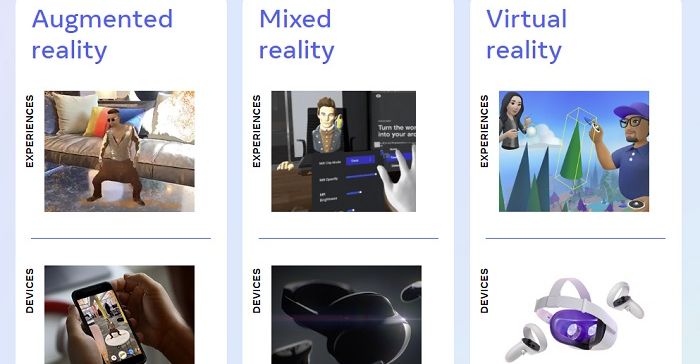SOCIAL
Meta Paints a Picture of an Idealistic Metaverse in New Future Planning Report

Meta has published a new report which looks at how its planned metaverse will help to facilitate more inclusion and opportunity, with the underlying technologies and concepts being built, from the ground up, by a more diverse set of creators and experts.
Which seems as much optimistic as factual, but nevertheless, the report also provides some interesting insight into Meta’s broad-reaching metaverse vision – or ‘the next chapter of the internet’, as Meta says.
Which is, indeed, broad-reaching, with Meta explaining that the metaverse that it sees will encapsulate several key interaction elements.
Of course, VR has been the main focus of Meta’s metaverse push, but the company actually groups all of its next-gen innovations and developments into the one bucket. Which is slightly confusing, but basically, Meta wants to claim ownership of the next stage by being the leader in all of these spaces.
Which also includes expanded collaboration with creators.
As per Meta:
“An array of technology companies are building products and experiences for the metaverse, and early versions of it already exist in the virtual universes of Fortnite and the photo filters on your smartphone.”
Yeah, those are very different experiences – Fortnite seems like a good proxy for what, seemingly, Meta envisions the metaverse becoming, a wholly digital environment, where users interact via avatar, and can travel between a range of different experiences in the app.
Photo filters? I mean, maybe.
“The metaverse will extend beyond that and include AR glasses that project digital information on the world around us like a heads-up display of a fighter pilot or your car windshield. And just as shopping is now a hybrid of online and offline, the metaverse will be a mixed reality that blends the digital and the physical.”
It’s an interesting conceptual overview, merging current use cases into this new environment. But whether all of these things will necessarily align remains to be seen.
A big part of its metaverse development, however, is ensuring participation from people that have ‘historically been excluded from the digital frontier’.
“As the metaverse begins to bloom, there’s a major power shift at play for creators as many find they’re less limited by the systems and structures of the past. Creators are developing new skills and monetizing more of their own intellectual property, as well as banding together and rewriting the rules of co-creation.”
That, in turn, Meta says, provides a platform for more people to create more meaningful experiences that are designed to be equitable, inclusive and empathetic.
“Ever the cultural pioneers, creators will play a critical role as a bridge to the metaverse for both people and brands.”

Again, a lot of this seems to be more hopeful projection than reality – but the hope, Meta says, is that the metaverse shift will provide more opportunities for creators from all walks of life to build their business, and career, around their passions in all-new ways.
Which may be true, though I don’t know that those opportunities are as within reach as Meta wants to suggest in this overview.
Regardless, Meta says that these considerations factor into how brands approach the metaverse shift, with Meta highlighting these specific elements:

By focusing on these elements, and exploring new ways to build in this new environment, that will help to unlock the full potential of the space.

I don’t know, I’m fairly skeptical about the impetus of the report, which looks to paint a utopian picture of what a theoretical metaverse might be. Because we know, based on past experiences, that no matter what you might hope, these visions generally don’t play out in this way.
You put a lot of people together in a room, and it’s not usually the best elements that are amplified, and while building towards hope, and the facilitation of such, is a noble approach, not sure that’s exactly how things are going to go in reality.
Or virtual reality – and all of this is also, theoretical, as the metaverse doesn’t yet exist.
It’s all theoretical fiction – in which case, it can be anything you want. Which is kind of what this report is all about.
You can check out Meta’s latest metaverse insights report here.
SOCIAL
Snapchat Explores New Messaging Retention Feature: A Game-Changer or Risky Move?

In a recent announcement, Snapchat revealed a groundbreaking update that challenges its traditional design ethos. The platform is experimenting with an option that allows users to defy the 24-hour auto-delete rule, a feature synonymous with Snapchat’s ephemeral messaging model.
The proposed change aims to introduce a “Never delete” option in messaging retention settings, aligning Snapchat more closely with conventional messaging apps. While this move may blur Snapchat’s distinctive selling point, Snap appears convinced of its necessity.
According to Snap, the decision stems from user feedback and a commitment to innovation based on user needs. The company aims to provide greater flexibility and control over conversations, catering to the preferences of its community.
Currently undergoing trials in select markets, the new feature empowers users to adjust retention settings on a conversation-by-conversation basis. Flexibility remains paramount, with participants able to modify settings within chats and receive in-chat notifications to ensure transparency.
Snapchat underscores that the default auto-delete feature will persist, reinforcing its design philosophy centered on ephemerality. However, with the app gaining traction as a primary messaging platform, the option offers users a means to preserve longer chat histories.
The update marks a pivotal moment for Snapchat, renowned for its disappearing message premise, especially popular among younger demographics. Retaining this focus has been pivotal to Snapchat’s identity, but the shift suggests a broader strategy aimed at diversifying its user base.
This strategy may appeal particularly to older demographics, potentially extending Snapchat’s relevance as users age. By emulating features of conventional messaging platforms, Snapchat seeks to enhance its appeal and broaden its reach.
Yet, the introduction of message retention poses questions about Snapchat’s uniqueness. While addressing user demands, the risk of diluting Snapchat’s distinctiveness looms large.
As Snapchat ventures into uncharted territory, the outcome of this experiment remains uncertain. Will message retention propel Snapchat to new heights, or will it compromise the platform’s uniqueness?
Only time will tell.
SOCIAL
Catering to specific audience boosts your business, says accountant turned coach

While it is tempting to try to appeal to a broad audience, the founder of alcohol-free coaching service Just the Tonic, Sandra Parker, believes the best thing you can do for your business is focus on your niche. Here’s how she did just that.
When running a business, reaching out to as many clients as possible can be tempting. But it also risks making your marketing “too generic,” warns Sandra Parker, the founder of Just The Tonic Coaching.
“From the very start of my business, I knew exactly who I could help and who I couldn’t,” Parker told My Biggest Lessons.
Parker struggled with alcohol dependence as a young professional. Today, her business targets high-achieving individuals who face challenges similar to those she had early in her career.
“I understand their frustrations, I understand their fears, and I understand their coping mechanisms and the stories they’re telling themselves,” Parker said. “Because of that, I’m able to market very effectively, to speak in a language that they understand, and am able to reach them.”Â
“I believe that it’s really important that you know exactly who your customer or your client is, and you target them, and you resist the temptation to make your marketing too generic to try and reach everyone,” she explained.
“If you speak specifically to your target clients, you will reach them, and I believe that’s the way that you’re going to be more successful.
Watch the video for more of Sandra Parker’s biggest lessons.
SOCIAL
Instagram Tests Live-Stream Games to Enhance Engagement

Instagram’s testing out some new options to help spice up your live-streams in the app, with some live broadcasters now able to select a game that they can play with viewers in-stream.
As you can see in these example screens, posted by Ahmed Ghanem, some creators now have the option to play either “This or That”, a question and answer prompt that you can share with your viewers, or “Trivia”, to generate more engagement within your IG live-streams.
That could be a simple way to spark more conversation and interaction, which could then lead into further engagement opportunities from your live audience.
Meta’s been exploring more ways to make live-streaming a bigger consideration for IG creators, with a view to live-streams potentially catching on with more users.
That includes the gradual expansion of its “Stars” live-stream donation program, giving more creators in more regions a means to accept donations from live-stream viewers, while back in December, Instagram also added some new options to make it easier to go live using third-party tools via desktop PCs.
Live streaming has been a major shift in China, where shopping live-streams, in particular, have led to massive opportunities for streaming platforms. They haven’t caught on in the same way in Western regions, but as TikTok and YouTube look to push live-stream adoption, there is still a chance that they will become a much bigger element in future.
Which is why IG is also trying to stay in touch, and add more ways for its creators to engage via streams. Live-stream games is another element within this, which could make this a better community-building, and potentially sales-driving option.
We’ve asked Instagram for more information on this test, and we’ll update this post if/when we hear back.
-

 SEO7 days ago
SEO7 days agoGoogle Limits News Links In California Over Proposed ‘Link Tax’ Law
-

 SEARCHENGINES6 days ago
SEARCHENGINES6 days agoGoogle Core Update Volatility, Helpful Content Update Gone, Dangerous Google Search Results & Google Ads Confusion
-
SEARCHENGINES7 days ago
Daily Search Forum Recap: April 12, 2024
-

 SEO6 days ago
SEO6 days ago10 Paid Search & PPC Planning Best Practices
-

 MARKETING6 days ago
MARKETING6 days ago2 Ways to Take Back the Power in Your Business: Part 2
-

 MARKETING4 days ago
MARKETING4 days ago5 Psychological Tactics to Write Better Emails
-

 PPC6 days ago
PPC6 days agoCritical Display Error in Brand Safety Metrics On Twitter/X Corrected
-

 SEARCHENGINES5 days ago
SEARCHENGINES5 days agoWeekend Google Core Ranking Volatility













You must be logged in to post a comment Login